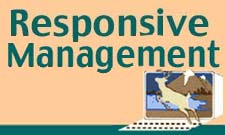Dealing With Nuisance Wildlife Issues a New Challenges for Fish and Wildlife Agencies

Harrisonburg, VA – -(AmmoLand.com)- Fish and wildlife agencies nationwide are under increasing pressure to respond to nuisance wildlife calls and situations. Yet many agencies receive no funding for these activities — it simply constitutes an added-on, unfunded responsibility.
The differences between the responses of Delaware residents and Division employees presented below reveal a common dilemma for many fish and wildlife agencies that involves wildlife management, funding, and public expectations: What level of involvement should fish and wildlife agencies have in managing nuisance wildlife?
In the survey, about 1 in 5 Delaware residents (22%) indicate that they have had problems with wild animals or birds in their neighborhood or around their home — that means that close to 150,000 Delaware residents experience such problems. The most common problem animals are deer, raccoons, opossums, birds, foxes, woodchucks or groundhogs, and squirrels. Common problems are damage to gardens, damage to yards, threat to humans, threat or harm to pets, getting into garbage, structural damage to homes or buildings, and agricultural damage.
Delaware residents were asked who they think should be most responsible for addressing nuisance wildlife problems in Delaware, and they could name more than one entity. A majority of residents named the Division (66% think the Division should be most responsible). Other commonly named entities include the property owners themselves (31%) and local or county governments (31%). Given the scenario that the Division would address nuisance wildlife in specific incidents, Delaware residents were asked if the Division should primarily provide advice and guidance only or provide services such as removal as well (or if the Division should provide both about equally). The large majority (75%) indicated that the Division should provide both about equally; otherwise, they are split between advice/guidance (12%) and services (10%). In this question, 85% of Delaware residents give an answer that entails the Division providing some removal services.
In follow-up, Delaware residents were presented with the scenario that the Division would provide removal services. Residents were then asked if they agree or disagree that the Division should charge a fee to do so, and they are evenly split: 46% agree, and 47% disagree.
Division employees were also asked if they agree or disagree that the Division should be responsible for the removal of nuisance wildlife, and a majority of employees (61%) disagree that the Division should be responsible for such removal.
In the same follow-up as the resident survey, employees were presented with the scenario that the Division would provide removal services. Employees were then asked if they agree or disagree that the Division should charge a fee to do so, and the large majority (80%) agree that the Division should charge a fee for such services.
Some fish and wildlife professionals feel that involvement with nuisance wildlife beyond simple technical assistance should not be the responsibility of the state fish and wildlife agency. Others feel that the issue should be embraced and that it represents an opportunity for additional funding and a way to connect the agency with urban and suburban residents. Some fish and wildlife professionals also feel that nuisance wildlife is a wildlife management issue that will not go away and should be dealt with by the agencies in some way.
Regardless of individual philosophy, agencies will have to deal with ever-increasing nuisance wildlife calls in one manner or another, and internal and external assessments such as this study can provide an important starting point for confronting new and non-traditional wildlife management issues
About:
Responsive Management is a public opinion survey research firm specializing in natural resource, wildlife, environmental, and outdoor recreation issues. Visit: www.responsivemanagement.com
